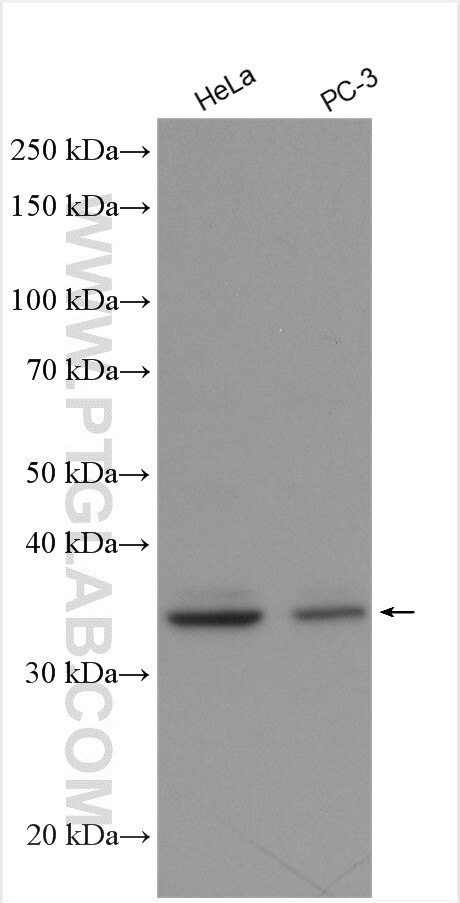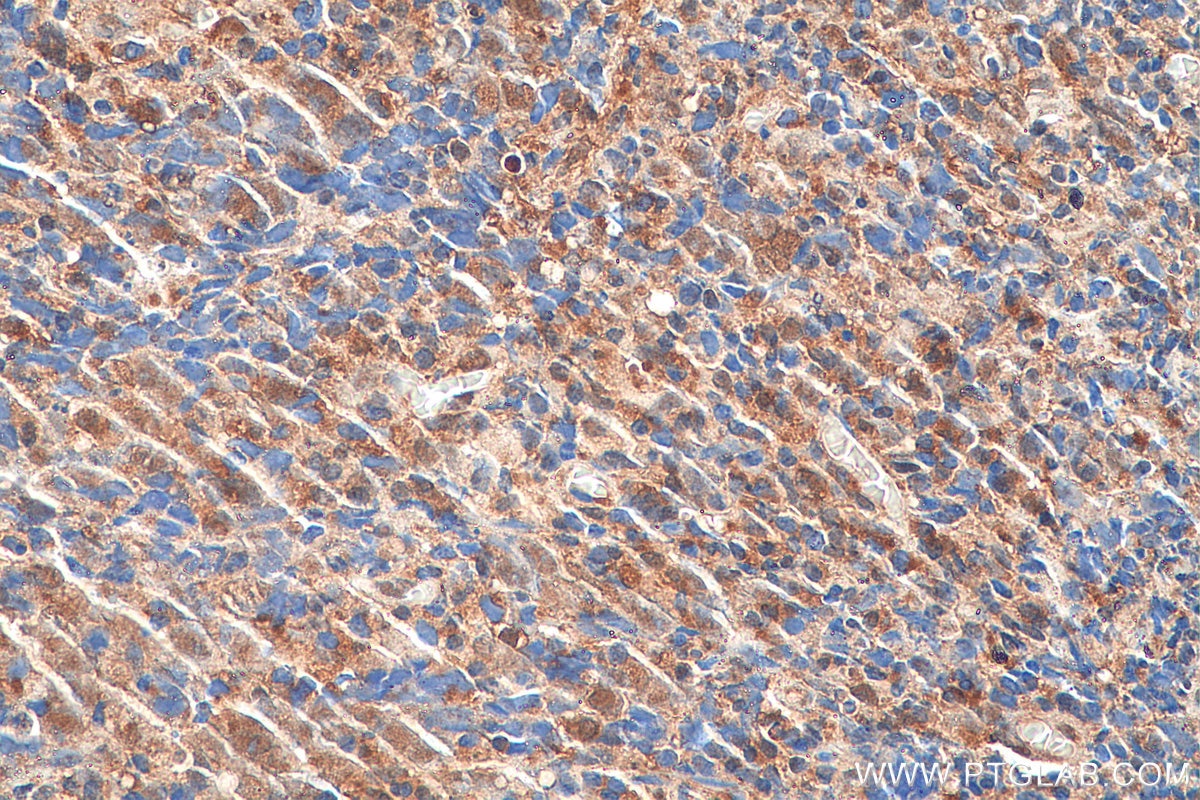- Phare
- Validé par KD/KO
Anticorps Polyclonal de lapin anti-BRCC3
BRCC3 Polyclonal Antibody for WB, IHC, ELISA
Hôte / Isotype
Lapin / IgG
Réactivité testée
Humain, rat, souris et plus (1)
Applications
WB, IHC, IF, CoIP, ELISA
Conjugaison
Non conjugué
N° de cat : 15391-1-AP
Synonymes
Galerie de données de validation
Applications testées
| Résultats positifs en WB | cellules HeLa, cellules PC-3 |
| Résultats positifs en IHC | tissu de carcinome nasopharyngé humain, il est suggéré de démasquer l'antigène avec un tampon de TE buffer pH 9.0; (*) À défaut, 'le démasquage de l'antigène peut être 'effectué avec un tampon citrate pH 6,0. |
Dilution recommandée
| Application | Dilution |
|---|---|
| Western Blot (WB) | WB : 1:1000-1:6000 |
| Immunohistochimie (IHC) | IHC : 1:50-1:500 |
| It is recommended that this reagent should be titrated in each testing system to obtain optimal results. | |
| Sample-dependent, check data in validation data gallery | |
Applications publiées
| KD/KO | See 1 publications below |
| WB | See 5 publications below |
| IHC | See 3 publications below |
| IF | See 1 publications below |
| CoIP | See 2 publications below |
Informations sur le produit
15391-1-AP cible BRCC3 dans les applications de WB, IHC, IF, CoIP, ELISA et montre une réactivité avec des échantillons Humain, rat, souris
| Réactivité | Humain, rat, souris |
| Réactivité citée | Humain, porc, souris |
| Hôte / Isotype | Lapin / IgG |
| Clonalité | Polyclonal |
| Type | Anticorps |
| Immunogène | BRCC3 Protéine recombinante Ag7584 |
| Nom complet | BRCA1/BRCA2-containing complex, subunit 3 |
| Masse moléculaire calculée | 36 kDa |
| Poids moléculaire observé | 35 kDa |
| Numéro d’acquisition GenBank | BC002999 |
| Symbole du gène | BRCC3 |
| Identification du gène (NCBI) | 79184 |
| Conjugaison | Non conjugué |
| Forme | Liquide |
| Méthode de purification | Purification par affinité contre l'antigène |
| Tampon de stockage | PBS with 0.02% sodium azide and 50% glycerol |
| Conditions de stockage | Stocker à -20°C. Stable pendant un an après l'expédition. L'aliquotage n'est pas nécessaire pour le stockage à -20oC Les 20ul contiennent 0,1% de BSA. |
Informations générales
BRCA1-BRCA2-containing complex subunit 3 (BRCC3), a Lys-63-specific deubiquitinase, is a member of the JAMM/MPN family of zinc metalloproteases. BRCC3 have been shown to promote the inflammasome activation by deubiquitinating NOD-like receptor containing pyrin domain 3 (NLRP3). BRCC3 is associated with G2/M arrest in breast cancer cells and DNA damage. The expression of BRCC3 is associated with increased cell proliferation. (PMID: 23246432, PMID: 30272359)
Protocole
| Product Specific Protocols | |
|---|---|
| WB protocol for BRCC3 antibody 15391-1-AP | Download protocol |
| IHC protocol for BRCC3 antibody 15391-1-AP | Download protocol |
| Standard Protocols | |
|---|---|
| Click here to view our Standard Protocols |
Publications
| Species | Application | Title |
|---|---|---|
Mol Cell Proteomics The mechano-ubiquitinome of articular cartilage: Differential ubiquitination and activation of a group of ER-associated DUBs and ER stress regulators | ||
Transl Oncol A Novel Scoring Model of Deubiquitination Patterns Predicts Prognosis and Immunotherapeutic Response in Hepatocellular Carcinoma | ||
J Agric Food Chem Methionine Promotes Milk Synthesis through the BRCC36-BRG1-mTOR Signaling Axis in Mammary Epithelial Cells
| ||
Adv Sci (Weinh) BRCC36 Deubiquitinates HMGCR to Regulate the Interplay Between Ferroptosis and Pyroptosis | ||
Int Immunopharmacol Deletion of BRCC3 ameliorates airway inflammation in asthma by inhibiting the activation of NLRP3 inflammasome | ||
Autophagy A bacterial RING ubiquitin ligase triggering stepwise degradation of BRISC via TOLLIP-mediated selective autophagy manipulates host inflammatory response |



